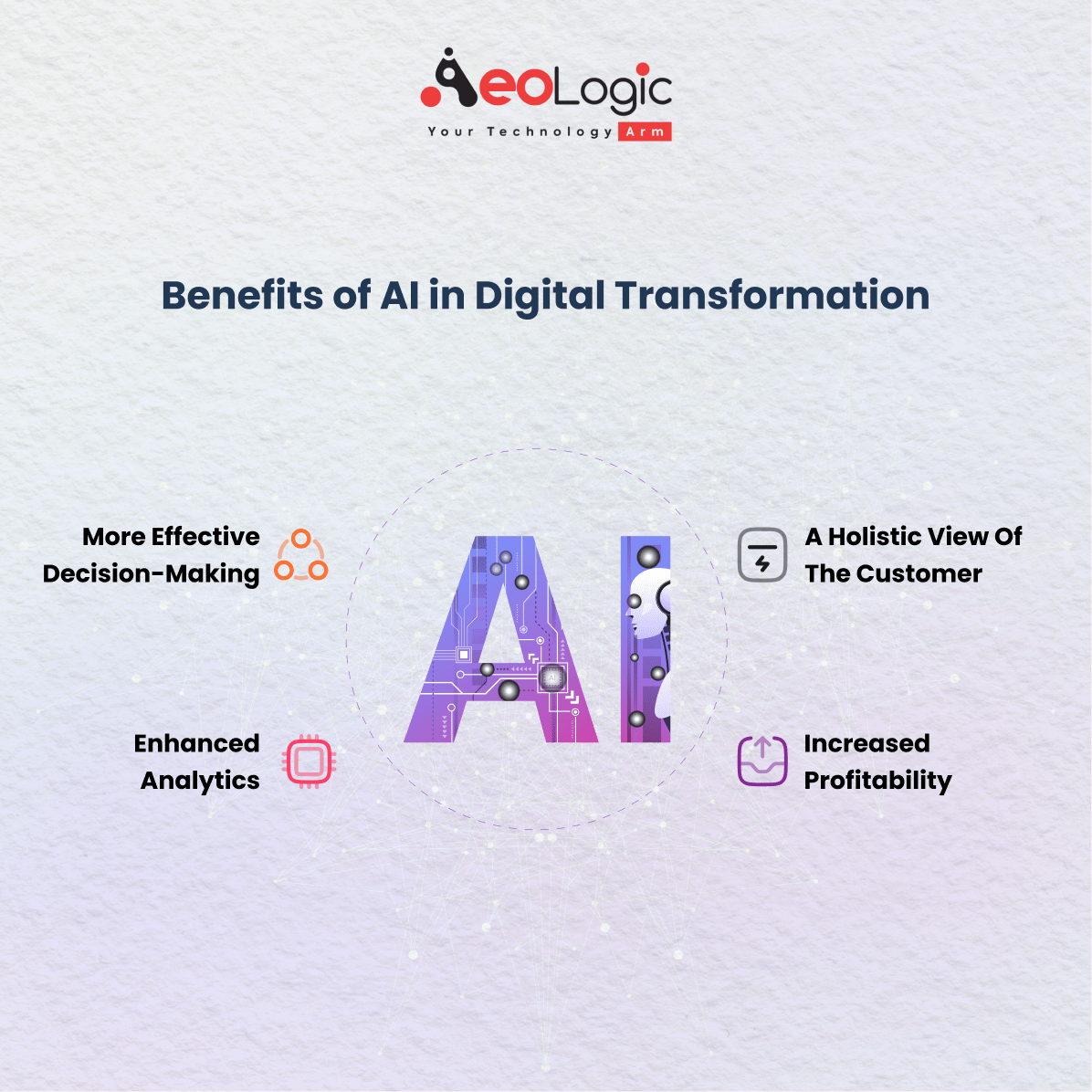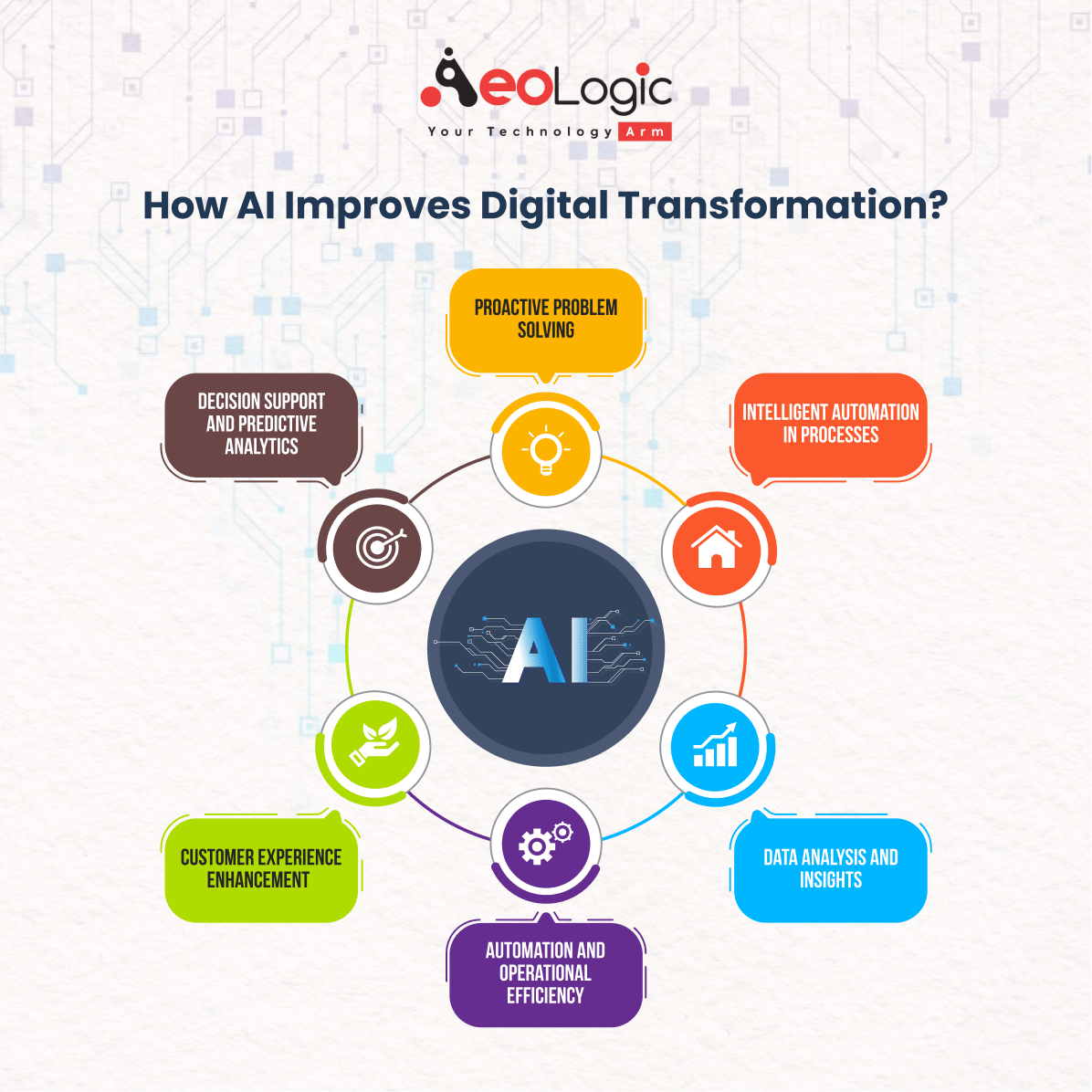In the evolving business terrain, Artificial Intelligence (AI) in Digital Transformation have surfaced as pivotal factors that are reshaping the geography. Associations, driven by technological advancements, are highly seeking to harness the role of Artificial Intelligence to enhance functional effectiveness, excerpt valuable perceptivity from data, and deliver exceptional services to their clients.
This collaboration between AI and business processes has fueled a change in thinking, allowing businesses to review their functional strategies, client relations, and value propositions, heralding a new period in digital transformation. Let’s get into the depth of this subject and interpret how the role of Artificial Intelligence serves as a catalyst in the digital transformation journey of a businesses.
Also read: The Role of Artificial Intelligence in IT Operations
What’s the Role of Artificial Intelligence in Digital Transformation?
Rather than machines replicating human intelligence processes, AI involves sophisticated algorithms acclimatized for specific tasks with well defined inputs. For case, role of Artificial Intelligence in digital transformation operates within predefined parameters and does not execute independent “thought.” Unlike traditional robotization, AI powered processes exceed at conforming to new information and unanticipated changes. The essential advantage lies in their capability to learn from both success and failure, enabling self correction and visionary analysis of data to anticipate challenges.
On contrast with standard robotization, which thrives in established processes, AI is most effective in diving complex challenges or situations not bound by preset rules. When given a set of inputs, AI can dissect the data and propose or automatically execute the optimal course of action, depending on the environment.
What are the Benefits of AI in Digital Transformation?

More Effective Decision Making
Contrary to represented in numerous shows and films, critical opinions shouldn’t solely calculate on feeling. Indeed experienced leaders bear access to comprehensive data to arrive at optimal conclusions. Time constraints frequently bear fast decision making.
The role of Artificial Intelligence in digital transformation plays a pivotal part in relating and pressing material information related to product performance, workflow optimization, and predictive issues. A well defined program can execute millions of simulations, furnishing a rough estimate of how a new product is likely to perform in its original six months based on available data.
Facilitated with such information, decision makers can more effectively assess remaining tasks, point implicit challenges, and make accurate prognostications regarding the time and resources needed to progress.
Increased Profitability
While AI does not replace human judgment, it proves to be a largely effective tool for optimizing time to value. Manufacturers continually grapple with the challenge of constantly delivering compliant products within highly tight deadlines. The role of Artificial Intelligence in digital transformation plays a vital part in streamlining product timelines by preemptively relating issues, conducting simulations, and cross-referencing against personal data.
By automating time consuming tasks, AI software liberates human resources to concentrate on the further cognitive aspects of product and mobile app development. It not only enhances effectiveness but also reduces resource conditions, leading to advanced profit perimeters.
Also read: Key Benefits of Artificial Intelligence for Modern Businesses
Enhanced Analytics
Data sets, frequently vast and intricate, appear from different sources and geographic locales. Historically, collecting, recycling, and assaying such data demanded significant time and labor force resources. While humans remain integral to the final analysis, AI in digital transformation significantly expedites every hand of this process, furnishing data results in a bit of the time. Particularly for large manufacturers with expansive means world wide, AI emerges as a pivotal element in delivering practicable perceptivity instantly.
A Holistic View of the Client
The foundation of the digital world is shaped by data, with its nature and sources constantly evolving. Traditionally, tools like cookies served to give associations with perceptivity into consumer experience. Still, due to increasing privacy issues and other considerations, there has been a significant drop in the use of cookies. Accordingly, companies must seek indispensable tools to gain a deeper understanding of their client’s actions.
AI enhanced software enables decision makers to potentially garner an advanced understanding of their clients compared to what cookies could achieve.
How AI Improves Digital Transformation?

Data Analysis and Perceptivity
The role of Artificial Intelligence in digital transformation processes and analyzes vast quantities of data rapidly and directly. Machine learning algorithms and data analytics services can identify patterns, trends, and correlations in data that might be challenging for traditional analytics tools. This capability provides associations with deeper perceptivity into their operations, client behaviour, and market trends, enabling further informed decision making.
Client Experience Improvement
AI powered tools, for example, as chatbots and virtual assistants, significantly ameliorate client relations. Natural Language Processing (NLP) allows these systems to understand and respond to human language. Thus, enhancing the overall client experience. Individualized recommendation machines powered by AI in digital transformation contribute to client satisfaction. By delivering applicable content and services acclimatized to individual preferences.
Robotization and Functional Effectiveness
AI driven robotization goes beyond traditional rule based processes. Machine learning algorithms enable robotization systems to acclimatize and learn from experience, making them more flexible and effective. It enhances functional workflows, reduces manual efforts, and allows associations to achieve advanced situations of effectiveness in their processes.
Decision Support and Predictive Analytics
The role of AI in digital transformation facilitates better decision making through advanced analytics and predictive modeling. By assaying historical data and relating patterns, AI systems can help in prediction, threat operation, and strategic planning. It empowers decision makers with valuable perceptivity, helping them make informed choices that align with organizational objectives.
Visionary Problem Working
Unlike traditional systems that operate grounded on predefined rules, AI systems can be visionary. They continuously dissect data in real time, allowing associations to anticipate challenges and openings. This visionary approach enhances business adaptability, enabling associations to address issues before they come critical and fleetly acclimatize to changing circumstances.
Intelligent Robotization in Processes
The role of AI automation in digital transformation enhances robotization by introducing intelligence into routine processes. It includes automating complex decision making tasks and conforming to changing conditions. Intelligent robotization not only accelerates processes but also improves delicacy and reduces errors, leading to further dependable and effective operations.

Also read: Transforming Businesses with AI Automation Solutions
Transform Your Business Digitally With Aeologic Technologies
We are a digital transformation services company that helps businesses achieve tangible results. And establish agile processes by offering custom made solutions based on the evaluation of their current capabilities. Our dedicated team of development is prepared to expedite comprehensive business growth. By using cutting edge technologies that give reliable and scalable results.






